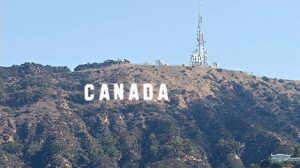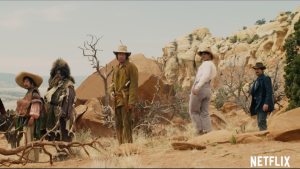
In Canada yesterday (aka the Great White North, aka Hollywood North) Netflix announced they’d be investing $500 million in original production here. Immediate thoughts: Woo-hoo! Happy days are here again! But then the cynic steps in. $500 million? That’s just 2 (count ‘em, two) Hollywood blockbusters. So…Chump change, you say? You’d be right. While the announcement may pacify our government, it inflamed fellow Canadian actors.
My water cooler round-up with esteemed actor colleagues
Tyrone Benskin, a (brilliant imho) actor with over 70 film and TV credits to his name and a former elected Member of Parliament to the Canadian government, was shooting in Shawinigan when I caught up with him yesterday. He said money is a good thing. “Netflix has been operating in Canada under their Canadian subsidiary for a number of years but have not had to play by the rules as other broadcasters. They’ve said they’re not a broadcaster, so shouldn’t have to abide by same rules.”
But Netflix has become a broadcaster. The semantics or delivery (streaming) may be different, but the population they’re reaching is as great (greater in some cases) as broadcast. At first, they were just a streaming company. Content was bought and curated. But as the hunger for more content grew, Netflix began to do two things differently. They began to buy streaming rights to existing series and indie films and call them Netflix “Original” productions. They also began producing their own shows.
This changes things
Tyrone, who while MP put in a stint as the Official Opposition Critic for Canadian Heritage, said, “One of issues in front of Heritage Minister was she going to mandate American Streaming companies [i.e. Netflix] to pay the same sales tax as other Canadian streaming companies, like Crave, and the defunct Show Me.”
Currently there is no legal requirement for Netflix to collect GST. It’s part of that Internet Loophole that Spotify and Amazon Prime also take advantage of. But little Canadian streaming competitor Crave must charge it. Says Tyrone, “They’re getting Canadian dollars, and not having to pay taxes on that.”
Matt Holland, writer (Toi et Moi, Moose TV, Gone Dark) and actor (Map of the Human Heart, Iqaluit) whose family is in the industry says “My initial reaction was excitement. I was pleased. But then, the devil is in the details. Right? Netflix is a slippery company. It always has been. They fight really hard to maintain that cryptic aspect part of their business. They don’t give out numbers and keep their development choices close to their chest.
“They’re kind of a Wild West entity”

In my own experience, I’ve found that slippery element to be true. I was recently contacted by a production house in Canada to help on a bid as a supplier to Netflix for Described Audio. We were given no details, no direction and found out later we were just another beefcake in a cattle call of companies. The suppliers they went with were in LA, which should come as no surprise. “8 out of 10 trucks in town are for Netflix productions,” said an LA industry friend of mine this Spring. The streamlining giant renewed their vow to Hollywood announcing they would invest 6 B$ jackpot in tinsel town to create original content. For actors, writers and producers in SoCal this signifies a pretty committed relationship, wouldn’t you say?
Ok. Is the Netflix investment in Canada announcement commensurate with the investment (on a population basis) in Los Angeles (if you say LA = the USA). Um, no. The Canadian investment will be spread over 5 years. The LA 6 Billion? That’s this year (2017) alone.
Yet, even though Netflix is in a promised relationship with LA, this streaming Sultan does have enough swing to support many other city and country wives. Like Narcos, filmed in Columbia, House of Cards in Baltimore, and Orange is the New Black, filmed in New York.
Or maybe they’re just throwing us a bone.
“They operate like regulations that others follow don’t apply to them,” says Matt. “Because of their size, they know how to throw their weight around. They threatened to take their toys and go home if they were going to have to pay tax. So, they announce they’re going to give us 2 weeks of their profit margin devoted to Canadian content.”
Two weeks?
Just how many Canadian dollars are they getting? $650 million with a predicted $820 in 2020 (statistica.com). So, if you figure federal and provincial sales taxes of about 15% for that amount you come up with…uh-huh. $500 million over 5 years.

“It’s like a get out of jail free card,” says Matt. “And they don’t have to submit to regulations or pay tax.”
Simon Peacock, international improv expert and voice director of more Ubisoft games than you’ve played, agrees. “I think it’s a carefully orchestrated PR event between the government & Netflix. It looks like a win. The government looks like they forced Netflix to give money to Canada, but to Netflix shareholders it doesn’t change their bottom line.”
So, Netflix avoids paying tax, but they will spend money on production here, right? Well….maybe not any more than they’re already spending. They are producing Riverdale here. (Vancouver) And they bought Trailer Park Boys (Nova Scotia) from Showcase. But they’re not producing anything in Montreal.
And if they do produce anything here, there’s really no way of knowing whether it actually will be “Can Con” per se.
Says Simon, “There’s no way of enforcing their ‘investment.’ No way of policing it. How do they define Canadian Content – do they define it as content that is shot in Canada or does that include a percentage of actors or writers who are Canadian? All they did today was tell how much money they plan to spend here.”
Hmmm… News of the fake variety, perhaps?
As Tyrone suggested the timing is fortuitous for Netflix and face-saving for Heritage Minister Melanie Joly. Netflix isn’t really announcing anything new. Their $100 million a year here amounts to 1.6% of their annual expenditures. If you go back to a (US-Canada customer) population comparison, that’s 10-fold less than they should be spending here. The percentage of Canadians to Americans who are subscribers (pop comparison) is also slightly greater here. 14% vs 11% (statista)
What would strengthen the Heritage Minister’s position? Details related to Canadian Content. Can Con, for the uninitiated was a government concept dreamt up in in the 70’s which challenged radio and TV broadcasters to commit to 10% of their content to being Canadian. It worked particularly well in the music industry. As a former Music Director of a couple radio stations in another life I can attest to the early difficulty of finding enough Can Con to appeal to our listeners.
One can only love Anne Murray so much

But over time, the Can Con model worked extremely well in the music industry, fostering talent like Rush and Bryan Adams, KD Lang, Alanis Morrisette, the Tragically Hip, Feist, Arcade Fire and Drake. Why has the model not worked so well for film and television?
Tyrone chimes in. “The last round with CRTC diluted the definition of Canadian content. Questions we need to ask are is this money going to be used for Canadian content because it is shooting in Canada? Not just employing actors in doorman roles, but in telling Canadian stories? That money should go into supporting our stories and telling them. And not stories about beaver or wheat or poutine. But storytelling from a Canadian perspective. We do have a different perspective vis a vis England , the US, Australia and when we tell stories from our perspective we do really incredible work… The Wedding in White, The Sweet Hereafter, Monsieur Lazhar.”
And let’s not forget my fav, “My American Cousin”
Tyrone adds, “I hope that this is something that will be recommitted and added to much like their commitment to Los Angeles. To their benefit, Netflix and other streaming companies have changes how things are broadcast and we better grasp that this is an ever-changing field. Content is king and those who produce content, superior content…they will survive these changes. My hope is that the powers that be, the Canadian decision makers see the value of Canadian content and stories, and don’t sell out.”
But if we add up CRTC Can Con dilution, Minister Joly’s attempt to put a pretty bow on what amounts to a box of air, and the streaming leviathan’s self-serving secrecy and Snidley Whiplash-esque tactics that hope has about as much a chance of coming true as a Miami mosquito surviving a Banff blizzard.
A female voice actor for 30 years, I’m a warm voice in a cold country, aka our Home and Native Land-eh? What is your take on this?
